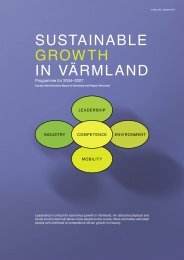PDF (222 KB) - Document Database website
PDF (222 KB) - Document Database website
PDF (222 KB) - Document Database website
Create successful ePaper yourself
Turn your PDF publications into a flip-book with our unique Google optimized e-Paper software.
ACHIEVING THE LISBON GOALS<br />
THE CONTRIBUTION OF VOCATIONAL EDUCATION AND TRAINING IN ROMANIA<br />
<br />
The ratification by the government of<br />
the draft Law on the Structure of<br />
Academic Studies aims to facilitate the<br />
implementation of the Bologna Process<br />
recommendations. As such, it is<br />
envisaged that this will bring about a<br />
wider range of educational provision<br />
and increased mobility for students and<br />
teaching staff.<br />
It is too early to assess the impact of these<br />
measures.<br />
1.4 INCENTIVES FOR<br />
UPDATING KNOWLEDGE AND<br />
SKILLS<br />
Main challenges<br />
A series of structural malfunctions could be<br />
mentioned in relation to the reference<br />
period of the present report: the inadequate<br />
correlation of the supply and demand for<br />
training; the insufficiently developed<br />
provision of continuing education; the<br />
rather low level of interest in acquiring and<br />
using new skills in the workplace; and the<br />
lack of social encouragement to participate<br />
in continuing education.<br />
New legislation on the funding of<br />
training and employers’ obligations<br />
There are practically no financial incentives<br />
for continuing training in Romania that<br />
have actually been operating for any length<br />
of time; it is difficult to evaluate the impact<br />
of newly created incentives. Although the<br />
Adult Training Law (Law 375/2002)<br />
mentions VAT exemption for authorised<br />
providers of vocational training, in practice<br />
the use of this facility is hampered by<br />
technical constraints. One of the most<br />
recent initiatives is Law 107/2004<br />
amending Law 76/2002 on unemployment<br />
compensation and stimulation of the labour<br />
force. With regard to employers who<br />
provide continuing vocational training<br />
(CVT) for their employees (through<br />
accredited programmes delivered by<br />
authorised service providers), the law<br />
stipulates that up to 50% of the employer’s<br />
costs for one annual training programme<br />
can be covered by the Unemployment<br />
Fund, provided that at least 20% of<br />
personnel participate in such training. The<br />
amendment also mentions the<br />
free-of-charge services for the vocational<br />
training of a number of groups:<br />
unemployed people; those working in rural<br />
areas who do not have a monthly income<br />
(or who have an income lower than the<br />
unemployment compensation level);<br />
persons who have resumed activity<br />
following the end of maternity leave;<br />
persons who have finished military service;<br />
and people whose date of release from<br />
prison is less than nine months away.<br />
Also important from this perspective are<br />
the requirements of the new Labour Code<br />
(Law 52/2003), which set out employers’<br />
mandatory responsibilities to ensure that<br />
their employees have constant access to<br />
training programmes (at least one week<br />
every two years), based on each<br />
company’s training plans as agreed with<br />
trade unions. However, no legal actions are<br />
specified against employers who fail to<br />
meet these obligations.<br />
The government is exploring alternative<br />
means of stimulating access to continuing<br />
training, such as the provision of fiscal<br />
facilities. A fiscal facility (regulated by the<br />
GO 129/2000) provides, for instance, tax<br />
incentives such as a reduction of taxes on<br />
profits (for companies) and income tax (for<br />
individuals) equivalent to expenditure on<br />
training.<br />
In terms of volume, EU funds are the most<br />
important incentive. The Phare<br />
programme’s Human Resource<br />
Development scheme is preparing<br />
Romania for ESF-type projects that will<br />
support training for employed and<br />
unemployed people on a regional basis.<br />
The 1997 Human Resource Development<br />
‘Progress’ programme was a forerunner of<br />
the ESF-type projects of the 1998, 2000<br />
and 2002 schemes. From 2004 onwards<br />
there will be a yearly grant scheme for<br />
CVT. Projects funded under the 2002<br />
scheme will commence in 2004.<br />
Strengthening the quality control of CVT<br />
provision<br />
With effect from January 2004 adult<br />
training providers are being accredited. By<br />
10








